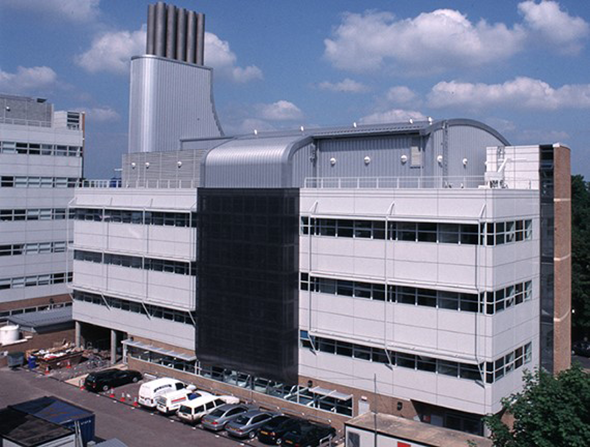
Submitted by Catherine Atkins on Tue, 02/04/2024 - 12:26
We are thrilled to share the news that the Early Cancer Institute – the UK's only research facility dedicated to understanding early cancer – has received a landmark £11 million donation to support its vital work in the fight against cancer.
Located on the Cambridge Biomedical Campus – the largest bioscience ecosystem in Europe – the Institute brings together world-leading expertise from across diverse fields including biology, physics, mathematics, epidemiology, medicine, and computer science under one roof with one goal: to predict and prevent cancer.
The donation will support the redevelopment of the Hutchison building, home to the Early Cancer Institute. This will enable the Institute to scale up its work, creating the cutting-edge laboratory space needed for its research teams to advance their early detection efforts and expand the Institute's research capabilities, attracting more world-class scientists and clinicians to join its teams.
The building will be renamed the Li Ka Shing Early Cancer Institute in honour of Hong Kong-based philanthropist Sir Ka-shing Li and the enduring partnership between the Li Ka Shing Foundation and the University of Cambridge in progressing the fight against cancer. Sir Ka-shing Li generously donated to the original Hutchison building in 2002, and then – in 2007 – to the Li Ka Shing Centre, which houses the CRUK Cambridge Institute.
Commenting on the renaming of the building in his honour, Sir Ka-shing Li said: "I am greatly encouraged that much advancement has been made towards cancer diagnosis, treatment and prevention. It is also evident now that early detection of cancer will yield the best chance of successful treatment and quality of life for the patient.
"It is a great privilege, therefore, to support the transformation of the Hutchison building to become a centre of excellence and a fitting home for the national Early Cancer Research Institute and a first of its kind in the UK. This inspirational journey with Cambridge University spanning over two decades fulfils my lifetime commitment to build the good of science, and I am truly gratified by this partnership."
Researchers at the Institute are focusing on cancers that are hard to treat, such as lung, oesophageal and liver cancers, and acute myeloid leukaemia. Detection and treatment methods have changed very little for these types of cancer over the past few years, and outcomes are often poor. Detecting and treating cancer earlier will dramatically increase survival rates and reduce healthcare costs across all tumour types.
By working across disciplines to understand the fundamental biology of how cancer develops and evolves, researchers at the Institute are making pioneering early detection research advances and translating these into clinical practice. They have used the power of theoretical physics methods to identify blood cancer years before the patient has symptoms, while biology and chemical engineering experts have collaborated to develop a method to detect and destroy early lung cancer.
The Institute’s director, Professor Rebecca Fitzgerald, pioneered the capsule sponge – a new test that can identify ten times more heartburn patients with Barrett’s oesophagus, a pre-cursor to oesophageal cancer. The device aims to catch the disease when it is easier to treat, thus helping more people survive.
Fitzgerald, also Professor of Cancer Prevention, remarked on the gift’s far-reaching impact, highlighting the importance of the redevelopment in helping researchers make life-saving scientific advances: "This extraordinary gift will provide the cutting-edge research facilities necessary to help our researchers develop pioneering early cancer detection innovations and take these from bench to bedside with even greater speed and focus, resulting in fewer cancer-related deaths worldwide."
Professor Richard Gilbertson, the Li Ka Shing Chair of Oncology said: "It is fitting that the home of this exceptional centre for research into the early detection of cancer should be renamed the Li Ka Shing Early Cancer Institute. From his inaugural gift to establish the Li Ka Shing Centre to house the Cancer Research UK Cambridge Institute, to the endowment of a new Professorship of Oncology, Sir Ka-shing Li has been a generous and constant partner in the University’s pioneering work to help create a world free of the fear of cancer."
The Vice-Chancellor, Professor Deborah Prentice, said: "New technologies are ensuring that ideas developed here in Cambridge can be used to benefit patients around the world, and we must ensure that as many people as possible are able to benefit from our cancer research. We are very grateful for Sir Ka-shing Li’s longstanding generosity, which has allowed us to make extraordinary progress in understanding this terrible disease. As our work continues, we look forward to developing novel ways of diagnosing cancer earlier and treating it more precisely and effectively."
